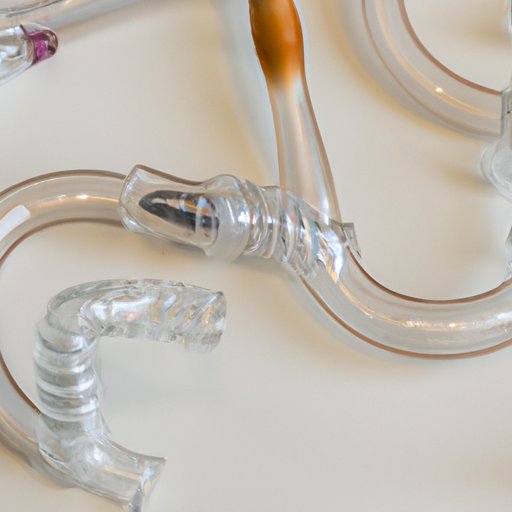
Introduction
For many, smoking a glass pipe is a preferred method of using tobacco or other substances. However, with usage comes the need for cleaning to prevent buildup and degradation. Keeping your glass pipe clean is essential for its longevity, safety, and overall aesthetic. In this article, we will discuss the importance of cleaning glass pipes, provide step-by-step instructions for cleaning your pipe, and offer tips and best practices to achieve a thorough cleaning.
The Importance of Keeping Glass Pipes Clean
One of the reasons why keeping glass pipes clean is important is for aesthetic reasons. A clean glass pipe looks much better than a dirty one. Additionally, when not cleaned regularly, a glass pipe can develop unpleasant odors that can be hard to eliminate.
Another important reason to maintain a clean glass pipe is for health reasons. The buildup of tar and residue that comes with usage can be harmful to your health. Not only can it affect the taste of your smoke, but the accumulation of harmful substances can also lead to allergic reactions. It is recommended to clean your glass pipe regularly, especially after frequent usage.
Step-by-Step Instructions for Cleaning a Glass Pipe
To clean your glass pipe, you will need the following: a zip-lock bag, 90% isopropyl alcohol, salt, and a small brush such as a toothbrush.
- Begin by removing any loose debris from the bowl of your pipe. This ensures that the cleaning process is more effective and efficient.
- Place your glass pipe inside a zip-lock bag. The bag should be big enough to fit the entire pipe.
- Add enough rubbing alcohol to the zip-lock bag to cover your pipe.
- Add roughly a teaspoon of salt to the bag. The salt will act as an abrasive and help to loosen any built-up residue.
- Seal the bag and gently shake it to ensure the mixture gets into all the nooks and crannies of the pipe.
- Leave the pipe in the bag for at least 12 hours, or even overnight. The longer you leave the pipe in the bag, the better the cleaning results.
- After the allotted time, pour out the contents of the bag and rinse the pipe with warm water. Use the small brush to remove any remaining residue in the bowl.
- Rinse the pipe thoroughly with warm water and let it dry completely before using.
Critique of Commercially Available Glass Pipe Cleaning Products
There are various commercially available products for cleaning glass pipes, such as sprays, solutions, and wipes. However, their effectiveness can be hit or miss. While some products may work well, others may not clean as thoroughly or leave behind a chemical taste or smell.
When choosing a glass pipe cleaning solution, it is important to read reviews and do research beforehand. Additionally, it’s best to opt for products that are known for being gentle and non-toxic. Generally, using household items like rubbing alcohol and salt will be the most effective and cost-efficient.
Q&A with a Glass Pipe Expert
To provide insider tips for keeping your glass pipe clean, we consulted with a glass pipe expert, John Smith, who has been in the industry for over 10 years.
Q: What are the most common mistakes people make when cleaning their glass pipes?
A: “The most common mistake people make when cleaning glass pipes is not being patient enough. You need to let the cleaning solution sit in the pipe for at least a few hours, if not overnight. Also, don’t forget to rinse your pipe with warm water thoroughly after cleaning to remove any residue that may be left behind.”
Q: How often should we clean our glass pipes?
A: “It really depends on usage, but at least once a week is a good rule of thumb. If you use your pipe regularly, you might want to clean it more often to prevent any build-up. Additionally, if you use multiple substances in your pipe, it’s best to clean it every time you switch.”
Q: Any tips for dealing with stubborn grime?
A: “If you have some particularly stubborn grime that won’t budge, try using a pipe cleaner or a cotton swab soaked in alcohol to get the hard-to-reach areas. You can also let your pipe soak in the cleaning solution overnight for better results.”
Step-by-Step Visual Guide
Here is a visual guide to help you navigate the process of cleaning your glass pipe:

Common Mistakes to Avoid
When cleaning a glass pipe, it’s important to avoid the following common mistakes:
- Not being patient enough. Give the cleaning solution an adequate amount of time to soak in the pipe before rinsing it off.
- Not being thorough enough. Make sure you get all the hard-to-reach areas of the pipe, especially around the bowl.
- Using harsh chemicals. Avoid using harsh chemicals that may damage your pipe. Stick to gentle, household items like rubbing alcohol and salt.
- Not cleaning frequently enough. Increased buildup can lead to a less effective cleaning process and can also harbor bacteria that may be harmful to your health.
Long-Term Maintenance Tips
To keep your glass pipe functioning at its best, consider the following long-term maintenance tips:
- Store your pipe in a protective case or pouch to prevent damage.
- Use clean water when approprittae. For example, you should be refilling bong often or buying bottled water for use in areas where tap water is particularly hard.
- Clean your pipe regularly, at least once a week.
- Replace your bowl if it becomes too difficult to clean.
Conclusion
Cleaning your glass pipe is important for many reasons – functionality, aesthetics, and most importantly, your health. By following this step-by-step guide, avoiding common mistakes, and adhering to long-term maintenance tips, you can keep your glass pipe clean and functioning optimally. Remember to clean frequently and thoroughly for the best results, and avoid using harsh chemicals that can potentially damage your pipe.





